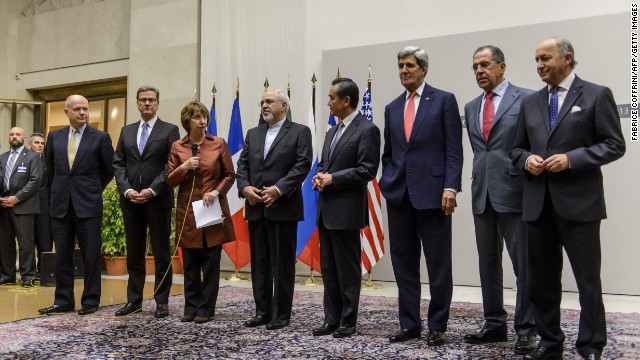M WAQAR..... "A man's ethical behavior should be based effectually on sympathy, education, and social ties; no religious basis is necessary.Man would indeed be in a poor way if he had to be restrained by fear of punishment and hope of reward after death." --Albert Einstein !!! NEWS,ARTICLES,EDITORIALS,MUSIC... Ze chi pe mayeen yum da agha pukhtunistan de.....(Liberal,Progressive,Secular World.)''Secularism is not against religion; it is the message of humanity.'' تل ده وی پثتونستآن
Sunday, November 24, 2013
20 questions about the Iran nuclear deal: What it says, what's at stake, what's next
When it comes to Iran and the West, the relationship has been convoluted for decades. And this deal is no different. After days of negotiations, six world powers and Tehran reached an agreement that calls on Iran to limit its nuclear activities in return for lighter sanctions. It's complicated politics coupled with complicated science.
Here's a quick primer to get you up to speed.
How did Iran's nuclear program start?
The United States launched a nuclear program with Iran in 1957. Back then, the Shah ruled Iran and the two countries were still friends. With backing from the United States, Iran started developing its nuclear power program in the 1970s. But the U.S. pulled its support when the Shah was overthrown during the Islamic Revolution in 1979.
Who are these 'six world powers'?
The talks involved the P5+1 group comprising diplomats from the U.S., UK, France, Russia, China and Germany -- and of course Iran. The group has been meeting in Geneva for days in hopes of reaching a diplomatic solution.
Reaction to deal in Tehran
Is Iran the only nation with a nuclear program?
No.
Eight nations are known to have nuclear weapons, including all the P5+1 countries, except for Germany. Iran's neighbor, Israel, has always declined to confirm whether it has any, although the Federation of American Scientists estimates it has about 80 atomic weapons. But since the 1979 revolution, concerns have escalated that Iran could enrich uranium and make atomic weapons. Iran has maintained its nuclear program is only for peaceful purposes.
Why have the other nations not faced as much scrutiny?
For nations such as India and Pakistan, no action was taken partly because they never signed the Treaty on the Non-Proliferation of Nuclear Weapons. "There was very little that the U.S. could've done to stop Pakistan," says Mark Hibbs, a nuclear policy expert at the Carnegie Endowment for International Peace. Iran, on the other hand, signed the treaty. And as a result, its program was put under the spotlight. In addition, the International Atomic Energy Agency had information suggesting Iran conducted activities it hasn't declared in the past.
Why is Iran's nuclear program considered such a threat?
Since its revolution, the West has worried Iran could use its nuclear program to produce atomic weapons using highly-enriched uranium. A decade ago, nuclear inspectors from the international agency announced they had found traces of highly-enriched uranium at a plant in Natanz. Iran temporarily halted enrichment, but resumed enriching again in 2006, insisting enrichment was allowed under its agreement with the IAEA.
Enough with the background. Let's talk about the deal that was reached.
It's more of an interim agreement before the deal. Described as an initial, six-month deal, the White House says it includes "substantial limitations that will help prevent Iran from creating a nuclear weapon." In short, it slows the country's nuclear development program in exchange for lifting some sanctions while a more formal agreement is worked out.
It's not permanent, so why is it a big deal?
For years, Iran and Western powers have left negotiating tables in disagreement, frustration and open animosity. But the diplomatic tone changed after Iran's election this year, which saw President Hassan Rouhani take over. " For the first time in nearly a decade, we have halted the progress of the Iranian nuclear program," U.S. President Barack Obama says.
Subscribe to:
Post Comments (Atom)


No comments:
Post a Comment